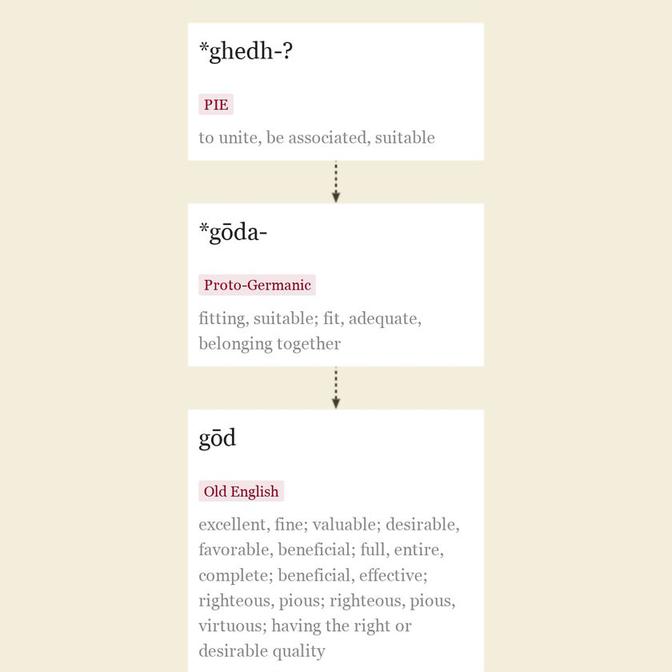Entries linking to good morning
Old English gōd (with a long "o") "excellent, fine; valuable; desirable, favorable, beneficial; full, entire, complete;" of abstractions, actions, etc., "beneficial, effective; righteous, pious;" of persons or souls, "righteous, pious, virtuous;" probably originally "having the right or desirable quality," from Proto-Germanic *gōda- "fitting, suitable" (source also of Old Frisian god, Old Saxon gōd, Old Norse goðr, Middle Dutch goed, Dutch goed, Old High German guot, German gut, Gothic goþs). A word of uncertain etymology, perhaps originally "fit, adequate, belonging together," from PIE root *ghedh- "to unite, be associated, suitable" (source also of Sanskrit gadh- "seize (booty)," Old Church Slavonic godu "favorable time," Russian godnyi "fit, suitable," Lithuanian goda "honor," Old English gædrian "to gather, to take up together").
Irregular comparative and superlative (better, best) reflect a widespread pattern in words for "good," as in Latin bonus, melior, optimus.
Sense of "kind, benevolent" is from late Old English in reference to persons or God, from mid-14c. of actions. Middle English sense of "holy" is preserved in Good Friday. That of "friendly, gracious" is from c. 1200. Meaning "fortunate, prosperous, favorable" was in late Old English. As an expression of satisfaction, from early 15c. Of persons, "skilled (at a profession or occupation), expert," in late Old English, now typically with at; in Middle English with of or to. Of children, "well-behaved," by 1690s. Of money, "not debased, standard as to value," from late 14c. From c. 1200 of numbers or quantities, "large, great," of time or distance, "long;" good while "a considerable time" is from c. 1300; good way "a great distance" is mid-15c.
Why then, can one desire too much of a good thing. ["As You Like It"]
As good as "practically, virtually" is from mid-14c.; to be good for "beneficial to" is from late 14c. To make good "repay (costs, expenses), atone for (a sin or an offense)" is from late 14c. To have a good mind "have an earnest desire" (to do something) is from c. 1500. Good deed, good works were in Old English as "an act of piety;" good deed specifically as "act of service to others" was reinforced early 20c. by Boy Scouting. Good turn is from c. 1400. Good sport, of persons, is from 1906. The good book "the Bible" attested from 1801, originally in missionary literature describing the language of conversion efforts in American Indian tribes. Good to go is attested from 1989.
"first part of the day" (technically from midnight to noon), late 14c., a contraction of mid-13c. morwenynge, moregeninge, from morn, morewen (see morn) + suffix -ing, on pattern of evening. Originally the time just before sunrise.
As an adjective from 1530s; as a greeting by 1849, short for good morning. Morning after in reference to a hangover is from 1884; in reference to a type of contraception, attested by 1967. Morning sickness as a symptom of pregnancy is from 1793 (Old English had morgenwlætung). Morning glory, the twining plant, is from 1814, so called because the colorful trumpet-shaped flowers open only in the early morning. Morning star "Venus in the east before sunrise" is from 1530s (Old English had morgensteorra "morn-star").
"morning," 12c. in compounds (morge-sclep "morning-sleep," morgewile "period around daybreak"); mid-13c. as morewe; c. 1300 as morwe; a shortened variation of morewen "morrow" (see morn). It was formerly common in the salutation good morrow (late 14c.).
Trends of good morning
More to Explore
updated on September 28, 2017
Trending words
Dictionary entries near good morning
goo
goober
good
good den
Good Friday
good morning
good will
good-bye
good-day
good-for-nothing
good-humored


